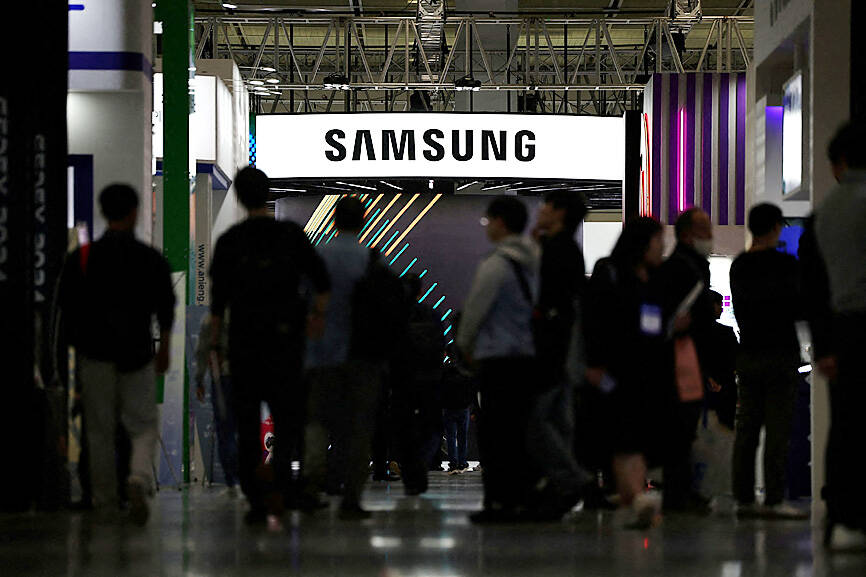Samsung Electronics Co and Texas Instruments Inc completed final agreements to get billions of US dollars of government support for new semiconductor plants in the US, cementing a major piece of US President Joe Biden administration’s CHIPS and Science Act initiative.
Under binding agreements unveiled Friday, Samsung would get as much as US$4.75 billion in funding, while Texas Instruments stands to receive US$1.6 billion — money that would help them build facilities in Texas and Utah. The final deals mean the chipmakers can begin collecting the funding when their projects hit certain benchmarks.
Though the terms of Texas Instruments’ final agreement is in line with a preliminary deal, Samsung is getting substantially less than originally expected.

Photo: Reuters
“Our mid-to-long-term investment plan has been partially revised to optimize overall investment efficiency,” Samsung said in a statement, indicating that its project would not be as large as originally planned.
The CHIPS Act, signed into law by Biden in 2022, set aside US$39 billion in grants, loans and loan guarantees worth US$75 billion and 25 percent tax credits. It aims to boost US semiconductor production after decades of manufacturing shifting abroad.
Officials have divvied up most of that money, with US Secretary of Commerce Gina Raimondo racing to finalize as many deals as possible before leaving office.
The latest awards round out the program’s biggest grants, helping ensure that there is comprehensive local production of semiconductors. Texas Instruments is the largest maker of analog chips and embedded processors. Samsung is the world’s top maker of memory chips and a major provider of advanced outsourced production for other companies.
China has boosted its manufacturing capacity of analog and embedded chips, attempting to be more self-reliant in this vital area. That has made it all the more important for the US to do the same.
In a separate announcement, the US Department of Commerce also firmed up plans to deliver US$407 million in direct funding to Amkor Technology Inc. The money would support that company’s investment in Arizona, where it is building more capacity for what is called advanced packaging.
Texas Instruments’ award would help fund three new large plants: two in Sherman, Texas, and one in Lehi, Utah. They would create 2,000 new positions for the Dallas-based company, it said.
Samsung is expanding its facilities in central Texas. That would include work on so-called logic chips — components that act as the brains of systems — and a research and design facility in Taylor. The company also would be expanding an existing site in Austin.
Texas Instruments has said it plans to spend about US$40 billion to build five new US factories: one in Utah and four in Texas. The government funding supports just the first two Texas factories, since officials are prioritizing projects that would be in production by the end of the decade.

CHIP RACE: Three years of overbroad export controls drove foreign competitors to pursue their own AI chips, and ‘cost US taxpayers billions of dollars,’ Nvidia said China has figured out the US strategy for allowing it to buy Nvidia Corp’s H200s and is rejecting the artificial intelligence (AI) chip in favor of domestically developed semiconductors, White House AI adviser David Sacks said, citing news reports. US President Donald Trump on Monday said that he would allow shipments of Nvidia’s H200 chips to China, part of an administration effort backed by Sacks to challenge Chinese tech champions such as Huawei Technologies Co (華為) by bringing US competition to their home market. On Friday, Sacks signaled that he was uncertain about whether that approach would work. “They’re rejecting our chips,” Sacks

Taiwan’s long-term economic competitiveness will hinge not only on national champions like Taiwan Semiconductor Manufacturing Co. (TSMC, 台積電) but also on the widespread adoption of artificial intelligence (AI) and other emerging technologies, a US-based scholar has said. At a lecture in Taipei on Tuesday, Jeffrey Ding, assistant professor of political science at the George Washington University and author of "Technology and the Rise of Great Powers," argued that historical experience shows that general-purpose technologies (GPTs) — such as electricity, computers and now AI — shape long-term economic advantages through their diffusion across the broader economy. "What really matters is not who pioneers

BUBBLE? Only a handful of companies are seeing rapid revenue growth and higher valuations, and it is not enough to call the AI trend a transformation, an analyst said Artificial intelligence (AI) is entering a more challenging phase next year as companies move beyond experimentation and begin demanding clear financial returns from a technology that has delivered big gains to only a small group of early adopters, PricewaterhouseCoopers (PwC) Taiwan said yesterday. Most organizations have been able to justify AI investments through cost recovery or modest efficiency gains, but few have achieved meaningful revenue growth or long-term competitive advantage, the consultancy said in its 2026 AI Business Predictions report. This growing performance gap is forcing executives to reconsider how AI is deployed across their organizations, it said. “Many companies

TAIWAN VALUE CHAIN: Foxtron is to fully own Luxgen following the transaction and it plans to launch a new electric model, the Foxtron Bria, in Taiwan next year Yulon Motor Co (裕隆汽車) yesterday said that its board of directors approved the disposal of its electric vehicle (EV) unit, Luxgen Motor Co (納智捷汽車), to Foxtron Vehicle Technologies Co (鴻華先進) for NT$787.6 million (US$24.98 million). Foxtron, a half-half joint venture between Yulon affiliate Hua-Chuang Automobile Information Technical Center Co (華創車電) and Hon Hai Precision Industry Co (鴻海精密), expects to wrap up the deal in the first quarter of next year. Foxtron would fully own Luxgen following the transaction, including five car distributing companies, outlets and all employees. The deal is subject to the approval of the Fair Trade Commission, Foxtron said. “Foxtron will be